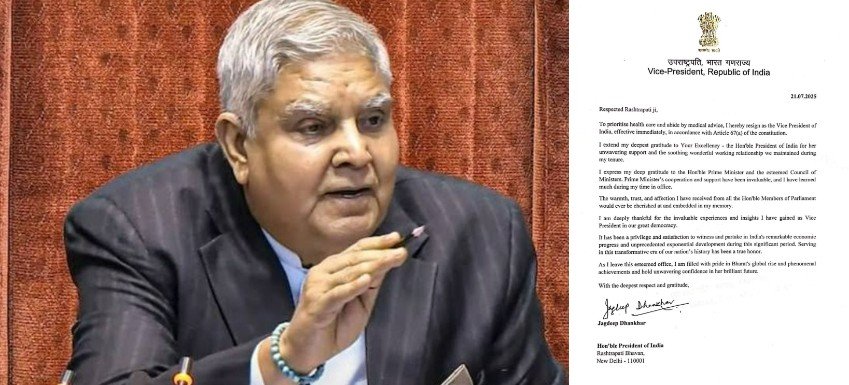In a surprise political development, India’s Vice President Jagdeep Dhankhar resigned from his post late Monday evening, triggering widespread speculation about the reasons behind the abrupt decision. Dhankhar, who also served as the Chairman of the Rajya Sabha, had nearly two and a half years left in his term, which was due to conclude in 2027.
The 74-year-old submitted his resignation to President Droupadi Murmu just hours after presiding over proceedings in the upper house of Parliament on the first day of the monsoon session. Citing medical reasons in his resignation letter, Dhankhar stated he wished to “prioritise health care and abide by medical advice,” prompting both sympathy and surprise within political circles.
“It has been a privilege and satisfaction to witness and partake in India’s remarkable economic progress and unprecedented exponential development during this significant period,” his resignation letter read. “Serving in this transformative era of our nation’s history has been a true honour.”
The ruling Bharatiya Janata Party (BJP), which had nominated Dhankhar for the position in 2022, has not issued an official statement in response to his departure. However, opposition parties were quick to question the timing and manner of the resignation, suggesting deeper political undertones.
Opposition MP Manish Tewari from the Indian National Congress called the resignation “totally unexpected,” adding, “No doubt Mr. Dhankhar must give utmost priority to his health, but clearly there is far more to this resignation than meets the eye.”
Echoing similar sentiments, Shiv Sena (UBT) spokesperson Anand Dubey expressed disbelief. “What is going on in this government?” he asked, noting that Dhankhar had been active earlier in the day, including administering oaths to newly elected Rajya Sabha members. “If health was the concern, the resignation could have been submitted before or after the session—not in the middle of such an important parliamentary moment,” Dubey said.
Adding to the intrigue, Congress MP Jairam Ramesh described the move as “unprecedented,” and suggested recent events may have influenced the decision. According to Ramesh, Dhankhar had taken offense at not being informed of the absence of two key ministers from a scheduled advisory committee meeting on Monday afternoon. The meeting was postponed to Tuesday, and by that evening, Dhankhar had submitted his resignation.
While no official connection has been made, the political climate has been further stirred by the receipt of an impeachment notice against High Court Justice Yashwant Varma. The notice, presented to Dhankhar earlier on Monday, was signed by over 50 MPs and follows a corruption scandal involving large sums of cash reportedly discovered at the judge’s residence. Justice Varma has denied any wrongdoing.
Dhankhar’s resignation also comes just months after he underwent angioplasty in New Delhi in March. Despite the procedure, he had returned swiftly to public duties, leading many to question whether health alone was the driving factor behind his decision to step down.
A seasoned lawyer and politician, Dhankhar began his political journey as an MP from Rajasthan’s Jhunjhunu in 1989. After joining the BJP in 2003, he led the party’s legal cell and later served as the Governor of West Bengal from 2019 to 2022—a period marked by frequent clashes with the state’s Trinamool Congress-led government.
In 2022, he was nominated by the BJP for the Vice Presidency and won the election comfortably. Since taking office, he had been known for his strict parliamentary discipline and close attention to constitutional procedures.
With the Vice President’s office now vacant, the President is expected to designate either the Deputy Chairperson of the Rajya Sabha or another member to temporarily manage Dhankhar’s responsibilities until a successor is elected.
As speculation continues, political observers are closely watching how the BJP handles the fallout and whether a broader realignment in national politics is underway.








